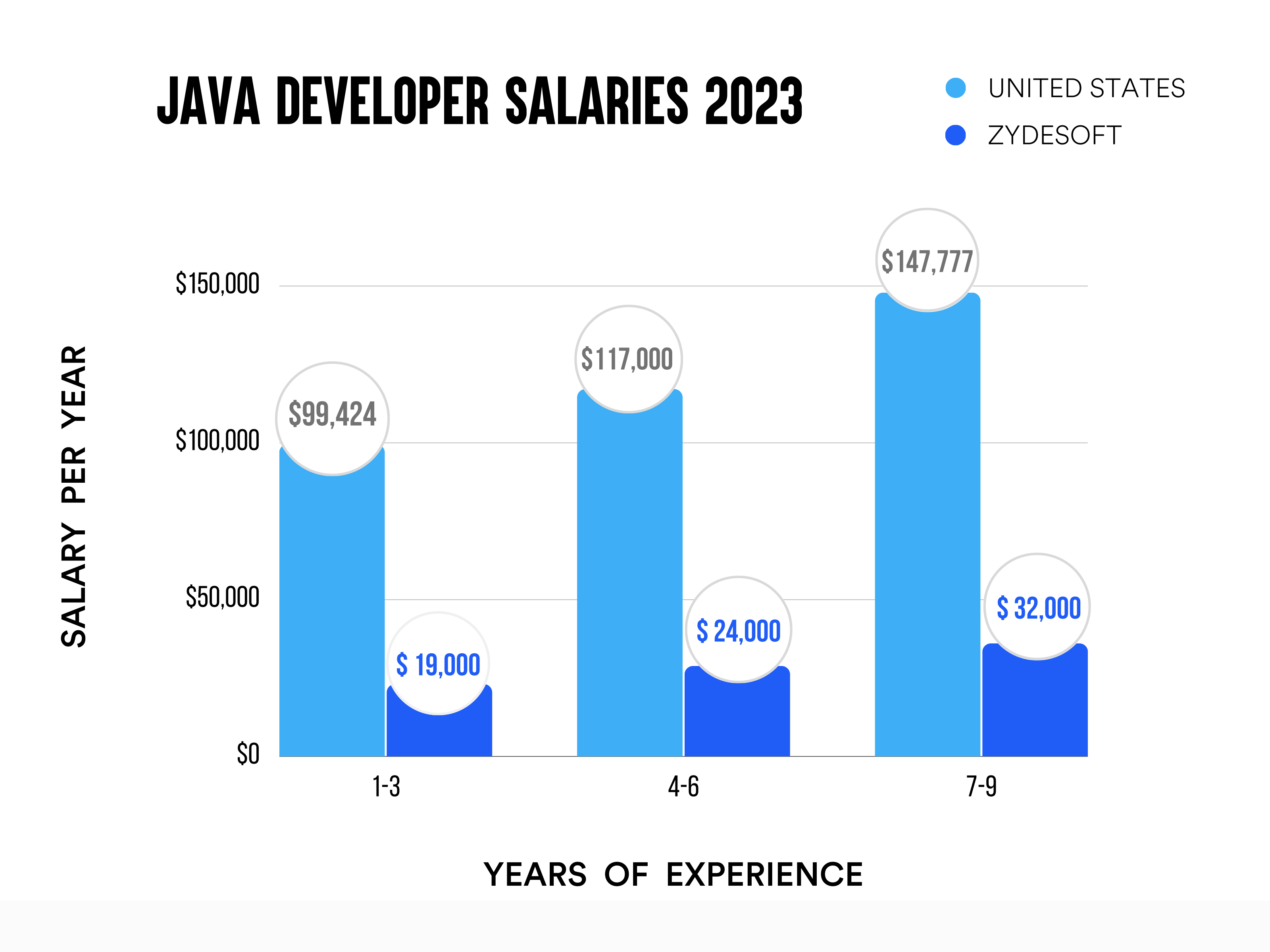Hire top 2% Java Developers remotely
Java powers cutting-edge tech - AI, IOT, Big data, Blockchain. Hire top-quality, timezone-friendly Java developers from ZydeSoft at $2400/month.
Java powers cutting-edge tech - AI, IOT, Big data, Blockchain. Hire top-quality, timezone-friendly Java developers from ZydeSoft at $2400/month.
Hire Silicon Valley-grade Java developers with 4-6 years of experience for just $2400/month.
Hire full-time, dedicated remote developers in just 14 days. Thanks to our developer community for making it a breeze to find developers quickly.
Our Senior interviewers from Fortune 500 companies make sure that the candidate selected from this 5+ hours long interview process is best in class.
We take care of all the paperwork - legal, HR, and accounting so you can focus on your business goals.
Once you fill out the form, our team will reach out to you to discuss more about your company, culture, and details about your dream developer(s).
We forward you the candidates who pass our vetting process for you to interview.
Begin your risk-free 2-week trial with the top hire. You will not be billed for this trial period.

Java is a widely used object-oriented programming language that was invented in 1991 by James Gosling from Sun Microsystems (now owned by Oracle Corporation). It is designed to be portable, meaning Java program written on a computer can be run on a mobile device without having to recompile.
Java is used for developing a wide variety of applications, including desktop and mobile software, web development and enterprise applications. It is ideally suited for developing server-side programmes, such as web servers, application servers, and database systems.
Fresh and improved software development tools are replacing stalwart technologies that were formerly seen as essential at a rapid pace. Given this ongoing change, Java's persistence is remarkable. More than 30 years after its inception, developers and organisations still favour Java over other programming languages like Python, Ruby, PHP, C++, and others to create applications.
Combining the benefits of Java and the best developer, companies build robust, secure enterpeise applications with ease. But hiring a skilled Java developer from a large pool of talents is a difficult task.
ZydeSoft provides experienced, vetted Java developers who add value to your company from day one.
There are several other reasons why you should use Java for your project in 2024:
Java is a mature and stable language that has been around for over two decades. It has been extensively tested and has a proven track record of reliability, which is important for mission-critical applications used by big enterprises.
Java is designed to be scalable, which means it can handle large-scale applications with ease. It is also designed to work well in distributed environments, which is important for large enterprises that need to manage multiple applications across
Java has built-in security features that help protect against common security threats, such as buffer overflows, SQL injection attacks, and cross-site scripting attacks. This is important for enterprises that handle sensitive data, such as financial institutions and healthcare providers.
Java code can be run on a wide range of platforms, including Windows, Linux, macOS, and mobile devices. This makes it easier for big enterprises to deploy applications across multiple platforms and devices.
Java has a rich ecosystem of libraries, frameworks, and tools that can help developers build applications faster and more efficiently. This is important for big enterprises that need to develop and maintain complex systems with large amounts of code.
Java is one of the most popular programming languages in the world, which means that there is a large pool of Java developers available. This is important for big enterprises that need to hire developers to work on their applications.
Java has gained a solid reputation among cutting-edge companies across different industries. Here are 10 big-name companies that use Java in their present-day applications.
Amazon uses Java to power many of its web services and internal systems.
Google uses Java extensively for its Android mobile operating system, as well as for many of its backend systems.
IBM uses Java for its software products, including its WebSphere application server and Rational Application Developer.
Oracle is the company that develops and maintains the Java programming language, and it uses Java extensively for its own products, including its flagship database management system.
LinkedIn's backend systems are primarily built using Java.
Twitter uses Java for its backend systems, including its search and analytics infrastructure.
Uber uses Java for its backend systems, including its ride-hailing and food delivery platforms.
Airbnb's backend systems are built primarily using Java.
Spotify uses Java for its backend systems, including its music recommendation algorithms.
Netflix's streaming platform is built on top of Java-based microservices.
A java developer can work on a wide variety of software development tasks
Develop web and mobile applications using Java, Java SE or Java EE, and related frameworks such as Spring and Hibernate.
Design and implement large-scale, distributed systems using Java and frameworks such as Apache Hadoop, Apache Spark, and Apache Flink for big data processing and analysis.
Build machine learning models, artificial intelligence systems, and business intelligence applications using Java frameworks and libraries such as TensorFlow, Deeplearning4j, and Apache Mahout.
Develop and integrate software systems using Java, leveraging technologies such as RESTful APIs and microservices architecture.
Use Java to work with databases, both SQL and NoSQL, and to perform data processing and analysis.
Develop and deploy cloud-based applications using Java and frameworks such as Spring Cloud.
Write and execute unit tests using JUnit and other testing frameworks.
Collaborate with other team members, including product owners, designers, and QA engineers, to develop and deliver high-quality software products.
There are certain skills that you should look for in the Java developer you hire
A java developer should have a good grasp of tha Java language and its core libraries in order to write efficient and well-organized code. They should be well versed in in OOPS concepts like encapsulation, inheritance and polymorphism.
A Java developer should be proficient in popular Java frameworks -Spring, Hibernate and Struts and libraries - Apache Commons, Google Guava, Log4j, JPA, and JSP to make the development faster and code efficient, and maintainable.
If you are hiring a Java developer for web development, they should have experience building web applications using Java web frameworks like Spring MVC or Struts, as well as front-end web technologies like HTML, CSS, and JavaScript to create visually appealing and responsive UIs.
A Java developer should have a solid understanding of databases and how to interact with them from Java code. In addition to knowledge of SQL, and CRUD operations, they should also have knowledge of database design principles, normalization, ability to optimize queries for performance.
A Java developer should have a good understanding of how software systems are integrated and deployed and be familiar with technologies like RESTful APIs, microservices, and containers. Knowledge of Web service Security concepts is required to implement secure web services that restrict access to authorized users securing customer information.
A Java developer should be proficient in writing and executing unit test cases using frameworks like JUnit or TestNG and have experience in Test-Driven Development (TDD), Behavior Driven Development (BDD) as these approaches ensure fewer bugs and errors so they spend less time fixing them.
A Java developer should be familiar with build tools like Maven, Gradle or Ant to automate the build process and manage dependencies. They should also have experience with Continous integration and deployment tools like Jenkins, Bamboo or TeamCity to automate testing and deployment.
Yet another crucial skill to look for in any developer is a deep understanding of Version Control systems like Git. He/she will be collaborating with a team of multiple front-end and back-end developers hence working knowledge of version control systems is important to ensure code sanity.
A Java developer should be familiar with story-driven agile software development methodologies, such as Scrum or Kanban, to deliver software in an iterative and incremental way.
Hiring a Java developer could be a painstaking process since you have to spend a lot of time drafting the interview questions. Below set of handcrafted interview questions can come handy.
TWhat is reflection in Java, and how can it be used?
What is the difference between a thread and a process in Java, and how can you create and manage threads in Java?
What is the difference between a ClassLoader and a SecurityManager in Java, and how can you use them to enforce security policies?
Can you explain the differences between the Java 8 Stream API and the Java Collections API? When would you use one over the other?
What are the differences between a Predicate and a Function in Java 8?
Can you explain how Java 8's functional interfaces can be used to create lambda expressions and method references?
How can you secure a Java web application, and what are common vulnerabilities that should be addressed?
Can you explain the SOLID principles of object-oriented design? How do you apply these principles in your architecture?
What are the pros and cons of a monolithic architecture versus a microservices architecture? In what situations would you recommend each one?
What are some common design patterns used in enterprise applications? How do you decide which patterns to use in a given situation?
The cost of living in some countries outside the United States is relatively low. By hiring full-time remote Java developers from a country with lower labor costs, businesses can reap several benefits, including cost savings, access to a pool of highly skilled and experienced developers with matching skill sets, and a lower turnover rate.
With ZydeSoft, these benefits are now within easy reach. Our platform enables businesses to hire remote Java developers within two weeks. Our developers are just as skilled and experienced as their US counterparts but are 60% less expensive. The following is a salary comparison chart of US developers versus our developers to give you an idea of how much you can save by working with us.

Average salary of a Mid level Java Developer in the US is $9,750 per month (source: talent.com)
Average salary of a Remote Mid level Java Developer hired from ZydeSoft is only $2,400 per month
Our developers are seasoned professionals with a strong foundation in software development. They have the technical skills to tackle any project with ease.
Our developers are highly professional and always adhere to industry best practices and standards.
Communication is the key to successful remote work. Our developers are fluent in English, both written and verbal.
Our developers are highly adaptable and can quickly learn new technologies and techniques to meet clients' changing needs.
Our developers guarantee minimum 4 hours of overlap with US time zones, ensuring seamless communication and collaboration.